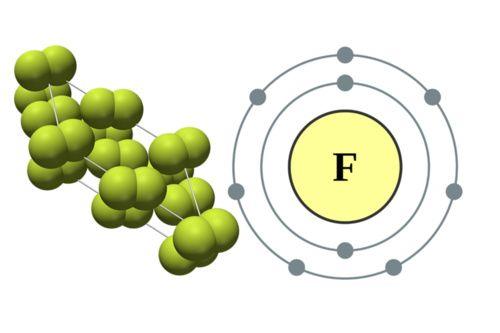Fluorine it is a mineral that is good for bones and teeth, but in excessive doses it can have significant side effects and be even poisonous. Let's find out better.
> 1. What is fluoride
> 2. Benefits and properties
> 3. Daily fluoride requirement
> 4. Effects of fluoride on the body

What is fluoride
Chemical symbol: F
Fluorine it is the most electronegative element of the periodic table; pure is not found in a solid state, but in a gaseous state: it is more heavy in the air, toxic, aggressive, pale yellow in color and with a pungent odor.
In fact, due to its high reactivity, fluorine is not found free in nature, but combined with other elements, especially silicates, and represents about 0,065% of the earth's crust.
In nature it is found as a fluoride ion, especially in fluorite or fluorapatite. Because it reacts with the other elements, it was difficult to isolate it, they only succeeded in 1886.
Poisonous nerve gas it was the first use of fluorinated chemical compounds for military purposes, where it also proved to be impoprtante to enrich uranium.
Benefits and properties of fluorine
Fluorine combined with carbon and other substances has been used since the 60s in many products and sectors, such as electricity, to make optical fibers, as a lubricant, as a coolant (freon).
It is used as agent in anti-caries products, mouthwashes, drops for babies, toothpastes; it is also used for batteries and, as we have seen, in the war industry.
Fluorine, present in small amounts in the tissues of the human body in the form of fluoride compounds, is found in those hard parts such as the skeleton and teeth. Various researches have shown that fluoride favors the deposition of calcium in the bones, fortifying them, and instead decreases the formation of acids in the mouth, thus reducing the development of caries and discomfort that can damage the enamel of teeth.
On the other hand, these theories are questioned the side effects that an overdose or an accumulation of fluoride can have on the body.
Although limited amounts of fluoride can be beneficial for the body, fluoride taken excessively it can cause a destruction of the phosphatase enzyme, which is essential for certain body processes, such as the metabolism of vitamins. It can also cause a dental pathology known as fluorosi.
Natural fluoride supplements: what they are and when to take them
Daily fluoride requirement
Daily consumption fluoride ideal for an adult individual will give 1,5 to 4 mg.
The ideal would be a gradual intake in the child which reaches up to 2,5 mg once they reach adulthood; from adulthood onwards 1,5 to 4mg are recommended.
A proper diet provides between 0,25 and 0,35mg of fluoride per day; drinking water provides about 1,0 / 1,5 mg, given that it depends on the presence of the element in the extraction soil (by law it must still be less than 1,5 mg per liter).
Effect of fluoride on the physique
Fluorine taken in the correct doses through water and food improves the state of the hard parts of the organism, può essere un valido alleato nell denti e gengive, per la mineralizzazione dello smalto, per l'osteoporosi o fratture ossee, l'arteriosclerosi o cardiovascular disorders.
Its use or integration has been and is still much discussed today, both because an abuse can cause fluorosis to the teeth, but also because other side effects may outweigh the benefits.
Properties and benefits of fluorite
Other articles on fluoride:
> Treat tooth decay with fluoride
| Wikipedia


























